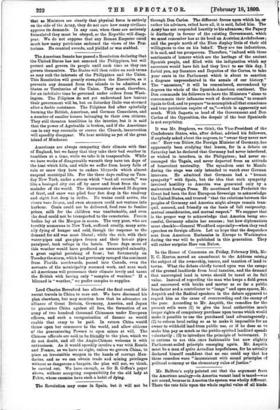The Revolution may come in Spain, but it will not
be through Don Carlos. The different forces upon which he, or rather his advisers, relied have all, it is said, failed him. The Army has not responded heartily to his advances; the Papacy is distinctly in favour of the existing Government, which we must remember has at its head an Austrian Archduchess ; and the people north of the Ebro display little of their old willingness to rise on his behalf. They are too industrious, it is said, and too prosperous. Therefore, "imbued with those sentiments of honour which are the heritage of the ancient Spanish people, and filled with the indignation which my ancestors would have felt had they lived to see this day, I forbid you, my Senators and Deputies of the Cortes, to take your seats in the Parliament which is about to sanction a disgrace unprecedented in the annals of our history:' The "ancestors," it will be remembered, surrendered by degrees the whole of the Spanish-American continent. The Don commands his followers to leave the Ministers "alone to consummate their infamous work of destruction," to commit Spain to God, and to prepare "to accomplish all that conscience and true patriotism require of us,"—which is apparently not much. With Sagasta as head of the Government and Don Carlos of the Opposition, the despair of the best Spaniards is not surprising.






































 Previous page
Previous page